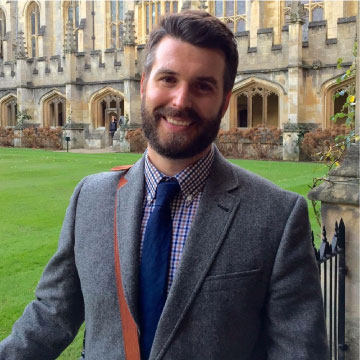Tyler Tully

What are your plans after graduation?
I’ve been accepted to the Doctor of Philosophy in Theology program (sub-field of Religion and Science) at the University of Oxford in the United Kingdom, where I also received the Arthur Peacocke Graduate Studentship in Theology Award. My interdisciplinary research engages Christology through the lens of post-humanist theory and animal studies.
What drew you to CTS?
CTS has a reputation of doing justice work in balance with cutting-edge theological and biblical studies. Through the advice of some mentors, I decided to pursue the MDiv program at CTS as I approached graduation during undergrad. I knew CTS would be a place where I could grow, but the practical “hands-on” focus of the MDiv went hand-in-hand with my liberationist theology. I wanted to be at a place that took theology and biblical studies seriously enough to engage the world like Jesus did. Sometimes that means healing, feeding, and teaching, but other times that means flipping over tables and speaking fiery truth to power.
What was your most transformative class or experience at CTS?
That’s a difficult question for me since it’s like asking which of my children is my favorite! We have twins so I’ll answer in kind. Two courses have been extremely transformative for me during my experience at CTS. First, the 2016 Israel-Palestine course was a once in a lifetime experience for me and many others. Not only did we get to see the ancient and historic sites of the Bible, but we also engaged with contemporary issues of justice, power, and spiritual transformation. I had the pleasure of experiencing that trip alongside CTS professors, trustees, and other students from all over the world. The second most transformative class for me is undoubtedly Ken Stone’s “Animals and Ecology in the Bible” course. Ask anyone else in that class and they will tell you the same. That course literally changed my life and was formative in my Constructive Theology thesis work that dealt with trauma and sacrifice in the Bible and also in operative theologies that abuse children in the Church. My future research at the University of Oxford utilizes much of what I was exposed to during that course, and I’m happy to say that I’ll continue to engage with Ken’s work while I’m doing my doctoral studies in the UK.
What did you value most about your time at CTS?
CTS provided me with so many wonderful opportunities, whether in representing the student body on the Academic Council and MDiv/MARL committees or engaging with the meaningful and fascinating work of scholars like Susan Thistlethwaite, Ken Stone, Ted Jennings, and Seung Ai Yang to name a few. But I’m also very grateful for the friends and colleagues made during our time together at CTS. If it were not for those relationships, I would not have made it through the program. Susan has grown from academic teacher to professional mentor, just as I’m now lucky to call folks like Joanne Terrell “friend.” But I don’t think my experience is unique in that regard. CTS, like any institution, consists of a matrix of interconnected relationships. My time at CTS brought me together with other MDiv and PhD students, but it also allowed me to work with the folks in the recruitment and development offices too. I consider myself an extremely lucky person to have been able to traverse almost every facet of CTS. I think I will forever remember the friendships made with my fellow seminarians. I really look forward to seeing their work as each are moving on to some amazing things in their vocational callings.